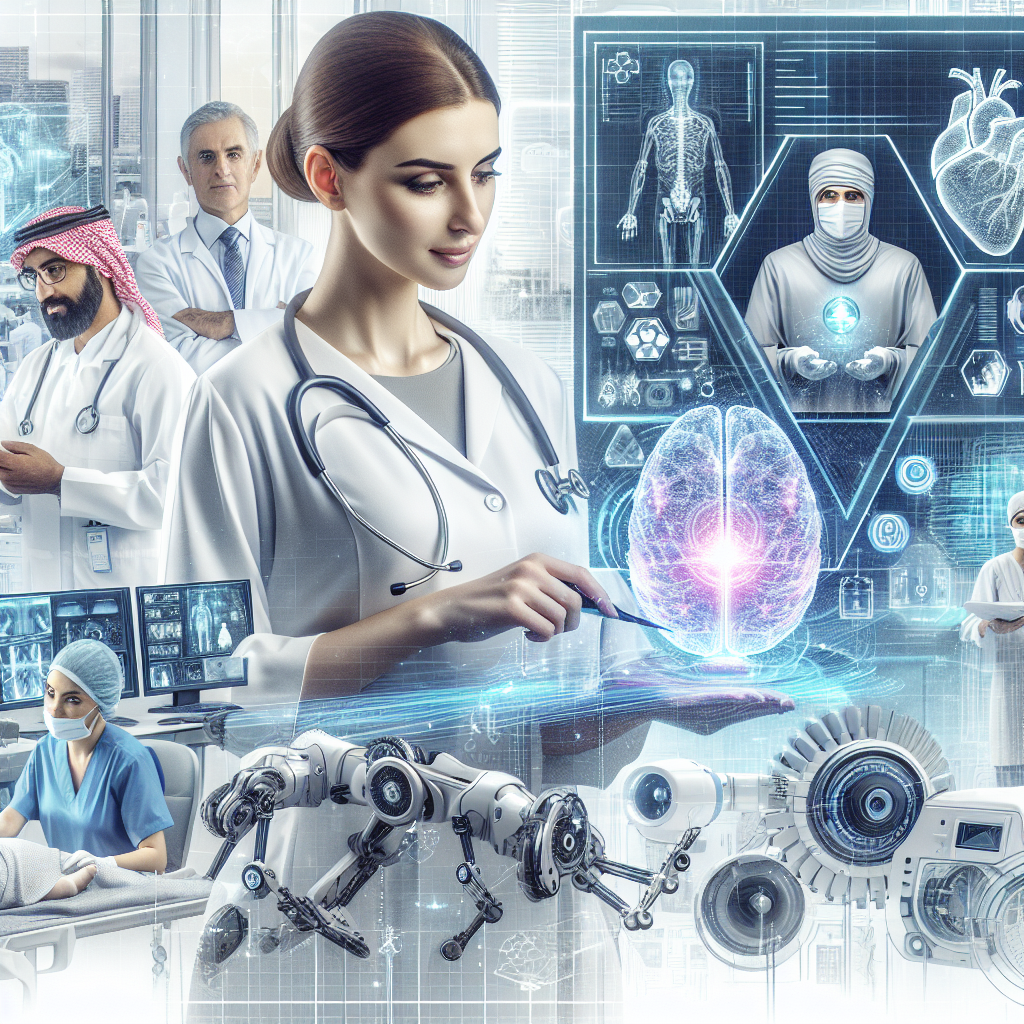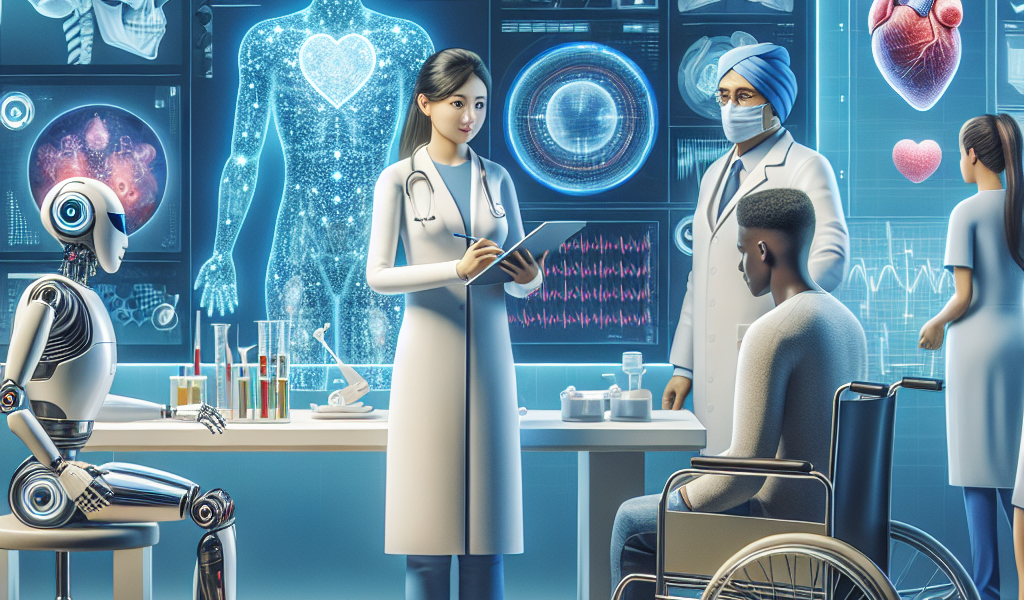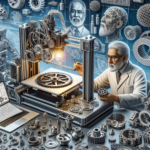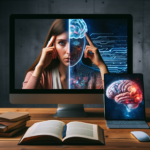-
Table of Contents
“Revolutionizing Healthcare: The Transformative Power of AI in Modern Medicine”
Introduction

The Role of AI in Modern Medicine
Artificial Intelligence (AI) is revolutionizing the field of modern medicine, offering unprecedented advancements in diagnostics, treatment, and patient care. By leveraging vast amounts of data and sophisticated algorithms, AI systems can analyze medical information with remarkable speed and accuracy, aiding in early disease detection, personalized treatment plans, and efficient management of healthcare resources. From enhancing imaging techniques to predicting patient outcomes and streamlining administrative tasks, AI is poised to transform healthcare delivery, making it more precise, efficient, and accessible. As AI continues to evolve, its integration into medical practice promises to improve patient outcomes, reduce costs, and address some of the most pressing challenges in healthcare today.
Enhancing Diagnostic Accuracy with AI
In recent years, the integration of artificial intelligence (AI) into the field of medicine has revolutionized the way healthcare professionals diagnose and treat patients. This technological advancement has not only enhanced diagnostic accuracy but also provided a new layer of support for overburdened medical practitioners. As AI continues to evolve, its role in modern medicine becomes increasingly indispensable, offering a blend of precision and efficiency that was previously unattainable.
One of the most significant contributions of AI in medicine is its ability to analyze vast amounts of data quickly and accurately. Traditional diagnostic methods often rely on the expertise and experience of medical professionals, which, while invaluable, can sometimes be prone to human error. AI, on the other hand, can process complex datasets, including medical histories, lab results, and imaging studies, with remarkable speed and precision. This capability allows for the identification of patterns and anomalies that might be overlooked by the human eye, thereby enhancing the accuracy of diagnoses.
Moreover, AI-powered diagnostic tools are particularly beneficial in the realm of medical imaging. Radiology, for instance, has seen a transformative impact from AI algorithms that can detect abnormalities in X-rays, MRIs, and CT scans with a high degree of accuracy. These algorithms are trained on thousands of images, learning to recognize the subtle differences between healthy and diseased tissues. Consequently, radiologists can use AI as a second opinion, ensuring that no detail is missed and that patients receive timely and accurate diagnoses.
In addition to improving diagnostic accuracy, AI also plays a crucial role in predicting patient outcomes. Predictive analytics, powered by AI, can assess a patient’s risk of developing certain conditions based on their medical history and other relevant factors. This proactive approach allows healthcare providers to implement preventive measures, potentially reducing the incidence of severe illnesses and improving overall patient outcomes. For example, AI can help identify patients at high risk for heart disease, enabling early intervention and lifestyle modifications that could prevent a heart attack.
Furthermore, AI’s role in enhancing diagnostic accuracy extends to personalized medicine. By analyzing genetic information, AI can help tailor treatments to individual patients, ensuring that they receive the most effective therapies for their specific conditions. This level of customization not only improves the efficacy of treatments but also minimizes the risk of adverse reactions, leading to better patient experiences and outcomes.
Despite the numerous advantages of AI in modern medicine, it is essential to acknowledge the challenges and ethical considerations that come with its implementation. Concerns about data privacy, the potential for algorithmic bias, and the need for rigorous validation of AI tools must be addressed to ensure that these technologies are used responsibly and effectively. Additionally, the integration of AI into healthcare should complement, rather than replace, the expertise of medical professionals. The human touch remains irreplaceable, particularly in providing compassionate care and understanding the nuances of each patient’s unique situation.
In conclusion, the role of AI in modern medicine is undeniably transformative, particularly in enhancing diagnostic accuracy. By leveraging the power of AI, healthcare professionals can provide more precise, timely, and personalized care to their patients. As we continue to navigate the complexities of integrating AI into healthcare, it is crucial to strike a balance between technological innovation and the irreplaceable human element that defines the practice of medicine. With careful consideration and ethical implementation, AI has the potential to significantly improve patient outcomes and revolutionize the future of healthcare.
AI-Powered Personalized Treatment Plans
In recent years, the integration of artificial intelligence (AI) into the medical field has revolutionized the way healthcare is delivered, particularly in the realm of personalized treatment plans. This transformation is not just a technological advancement but a profound shift that holds the promise of more effective, efficient, and compassionate care for patients. AI-powered personalized treatment plans are at the forefront of this change, offering a tailored approach to healthcare that considers the unique genetic, environmental, and lifestyle factors of each individual.
One of the most significant advantages of AI in personalized medicine is its ability to analyze vast amounts of data quickly and accurately. Traditional methods of developing treatment plans often rely on generalized protocols that may not account for the nuances of individual patient profiles. In contrast, AI algorithms can sift through electronic health records, genetic information, and even real-time data from wearable devices to identify patterns and correlations that might be missed by human practitioners. This capability allows for the creation of highly customized treatment plans that are more likely to be effective for the specific needs of each patient.
Moreover, AI’s predictive analytics can play a crucial role in anticipating potential health issues before they become critical. By analyzing historical data and identifying risk factors, AI can help healthcare providers develop proactive strategies to prevent diseases or manage chronic conditions more effectively. For instance, in the case of diabetes management, AI can predict blood sugar fluctuations and recommend adjustments in diet, exercise, or medication, thereby reducing the risk of complications and improving the patient’s quality of life.
Transitioning from the analytical prowess of AI to its practical applications, one cannot overlook the role of machine learning in drug discovery and development. Personalized treatment plans often require medications that are specifically tailored to an individual’s genetic makeup. AI can expedite this process by identifying potential drug candidates and predicting their efficacy and safety profiles. This not only accelerates the development of new therapies but also ensures that patients receive treatments that are more likely to work for them, minimizing the trial-and-error approach that can be both time-consuming and emotionally draining.
Furthermore, AI-powered personalized treatment plans extend beyond pharmacological interventions. They encompass a holistic view of patient care, integrating lifestyle modifications, mental health support, and continuous monitoring. For example, AI can recommend personalized exercise regimens and dietary plans based on a patient’s health data and preferences. It can also provide mental health support through AI-driven chatbots that offer real-time counseling and coping strategies, ensuring that patients receive comprehensive care that addresses both their physical and emotional well-being.
Despite the remarkable potential of AI in personalized medicine, it is essential to acknowledge the ethical and practical challenges that come with its implementation. Issues such as data privacy, algorithmic bias, and the need for robust regulatory frameworks must be addressed to ensure that AI-driven healthcare solutions are both safe and equitable. Additionally, the human touch remains irreplaceable in medicine. While AI can provide valuable insights and recommendations, the empathy, intuition, and experience of healthcare professionals are crucial in interpreting and applying these insights in a manner that resonates with patients.
In conclusion, AI-powered personalized treatment plans represent a significant leap forward in modern medicine, offering the potential for more precise, proactive, and patient-centered care. As we navigate the complexities of integrating AI into healthcare, it is imperative to strike a balance between technological innovation and the human elements of compassion and empathy that define the essence of medical practice. By doing so, we can harness the full potential of AI to improve health outcomes and enhance the quality of life for patients worldwide.
The Impact of AI on Medical Research and Drug Development
Artificial intelligence (AI) is revolutionizing various sectors, and its impact on medical research and drug development is particularly profound. As the world grapples with complex health challenges, AI emerges as a beacon of hope, offering unprecedented capabilities to accelerate discoveries and enhance patient outcomes. The integration of AI into medical research is not merely a technological advancement; it represents a paradigm shift in how we understand and treat diseases.
One of the most significant contributions of AI in medical research is its ability to analyze vast amounts of data with remarkable speed and accuracy. Traditional methods of data analysis, often labor-intensive and time-consuming, are being supplanted by AI algorithms that can sift through millions of data points in a fraction of the time. This efficiency is crucial in identifying patterns and correlations that might elude human researchers. For instance, AI can analyze genetic information, medical records, and clinical trial data to uncover insights that can lead to the development of new treatments and therapies.
Moreover, AI’s role in drug development cannot be overstated. The process of bringing a new drug to market is notoriously lengthy and expensive, often taking over a decade and costing billions of dollars. AI has the potential to streamline this process significantly. By using machine learning algorithms, researchers can predict how different compounds will interact with biological targets, thereby identifying promising candidates for further testing. This predictive capability not only accelerates the initial stages of drug discovery but also reduces the likelihood of costly failures in later stages.
In addition to speeding up the drug development process, AI also enhances the precision of personalized medicine. By analyzing individual patient data, AI can help tailor treatments to the specific genetic makeup and health profile of each patient. This personalized approach increases the efficacy of treatments and minimizes adverse effects, ultimately leading to better patient outcomes. For example, AI-driven tools can predict how a patient will respond to a particular medication, allowing doctors to make more informed decisions about treatment plans.
Furthermore, AI is instrumental in advancing our understanding of complex diseases. Conditions such as cancer, Alzheimer’s, and rare genetic disorders present significant challenges due to their intricate nature. AI can analyze large datasets from various sources, including genomic data, imaging studies, and clinical records, to identify potential biomarkers and therapeutic targets. This comprehensive analysis provides a deeper understanding of disease mechanisms, paving the way for innovative treatments and early detection methods.
Despite these promising advancements, the integration of AI in medical research and drug development is not without challenges. Ethical considerations, data privacy concerns, and the need for robust validation of AI models are critical issues that must be addressed. Ensuring that AI systems are transparent, unbiased, and secure is paramount to gaining the trust of both the medical community and the public. Collaborative efforts between technologists, researchers, and policymakers are essential to navigate these challenges and harness the full potential of AI in medicine.
In conclusion, the impact of AI on medical research and drug development is transformative, offering new avenues for discovery and innovation. By accelerating data analysis, streamlining drug development, and enabling personalized medicine, AI holds the promise of improving patient outcomes and addressing some of the most pressing health challenges of our time. As we continue to explore the possibilities of AI, it is crucial to approach its integration with a balanced perspective, mindful of both its potential benefits and the ethical considerations it entails.
Conclusion
The role of AI in modern medicine is transformative, offering significant advancements in diagnostics, treatment planning, and patient care. AI algorithms can analyze vast amounts of medical data with high accuracy, leading to early detection of diseases, personalized treatment plans, and improved patient outcomes. Additionally, AI-driven tools enhance the efficiency of medical workflows, reduce human error, and support medical research by identifying patterns and insights that may not be immediately apparent to human researchers. As AI technology continues to evolve, its integration into healthcare systems promises to revolutionize the field, making medical care more precise, efficient, and accessible.





